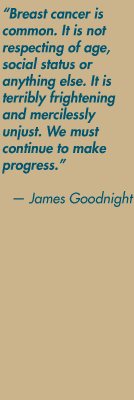|
DINA'S STORY
Radio journal chronicles a year in the life of a young breast cancer patient
By her own admission, Dina Howard is a planner, almost obsessively so. But nothing prepared the 39-year-old Sacramento mother of two for the turn her life took in the fall of 2005 when she was diagnosed with breast cancer.
Over the ensuing year, under the care of UC Davis physicians James Goodnight, Helen Chew and Janice Ryu, Howard made difficult decisions about surgery, chemotherapy and radiation.
"One week ago today, I was diagnosed with breast cancer … I got a real interesting e-mail from a friend: 'Welcome to the club that nobody wants to be a part of.'"
Along the way, she recorded her feelings and taped her experiences for a first-person documentary that aired in late December on Capital Public Radio, Sacramento's National Public Radio affiliate. The one-hour audio journal remains available online at www.capradio.org, along with photos and recordings from Howard's husband, her sister and her infusion nurse. In addition, Howard has recorded an update that can be heard on the UC Davis Cancer Center site at http://www.ucdmc.ucdavis.edu/cancer/Survivors/dina.html.
"… I feel very, very lucky, at the same time that I feel totally terrified. The lucky part is that I keep thinking about how much support, love, I have. The other side of the coin is, sometimes I just feel so scared, I can barely see."
Desire for meaning
A desire to create meaning from her illness inspired Howard, shortly after her diagnosis, to approach Capital Public Radio producer Paul Conley with a proposal to record a radio diary of her breast cancer treatment and recovery. "One of the most valuable things during the days after my diagnosis was when friends or friends of friends who had already had breast cancer shared their experiences with me," she explained.
Conley provided her with a digital tape recorder and offered to help her edit her audio journal entries into a documentary whenever she was ready.
"… Today I finally got an appointment with a highly recommended surgeon, and I think that's a really big deal …"
The surgeon was Goodnight, professor and chair of the Department of Surgery at UC Davis and a specialist in breast cancer surgery.
Cancer more extensive
In an initial operation, Goodnight discovered Howard's cancer was more extensive than mammography had been able to detect. She would need a mastectomy of her right breast. Ultimately, to reduce her risk of subsequent cancer, Howard elected to have a bilateral mastectomy.
Howard had her tape recorder with her from the very beginning. It was on in her hospital room following the double mastectomy. She carried it with her to an appointment with Chew, the director of the Clinical Breast Cancer Program at UC Davis, and into the radiation oncology clinic, where Ryu, an associate professor of radiation oncology, oversaw her care.
Howard's care team also included oncology pharmacists, radiation therapists, physicists, dosimetrists, a genetic counselor and patient education specialists. Listeners meet pharmacist Amy Tam, infusion nurse Mia Wilson and a radiation therapist who, in a warm voice, assures Howard, "You're almost done."
"As much as I'm feeling scared and apprehensive … I know that the people around me are going to help me get through this."
The audio diary ends following Howard's final radiation treatment. The young cancer survivor records her last entry on the beach in Santa Barbara, where she, her husband Before diagnosis: Dina with her husband, Ed, and their children, Noah and Maya. and children are spending Thanksgiving with her parents.
"… I feel like I taste my life – every moment has a flavor. And I'm so grateful for every single taste."
Bright prognosis
For women like Howard, the prognosis has never been brighter. She benefited from good clinical trial data supporting aggressive adjuvant chemotherapy, genetic testing advances that reassured her she does not carry the breast cancer genes BRCA1 or BRCA2 – good news for her sisters and daughter – and solid research establishing the effectiveness of sentinel node biopsy, a minimally invasive option that spared her the need to have more lymph nodes removed. Over the next five years, she will reduce her risk of a breast cancer recurrence by up to 50 percent by taking tamoxifen, a drug that targets estrogen-positive breast cancers.
But more research is needed. "Breast cancer is common. It is not respecting of age, social status or anything else. It is terribly frightening and mercilessly unjust," Goodnight said. "We must continue to make progress."
Waves crash on the Santa Barbara shore as Howard continues her closing diary entry: "… It's so beautiful here. My beautiful children are on the other side of the beach, digging in the sand, wearing shorts, squishing toes in the sand. I look at them, and my heart just melts. This year has made me incredibly grateful to be alive … I want to keep that."
|


